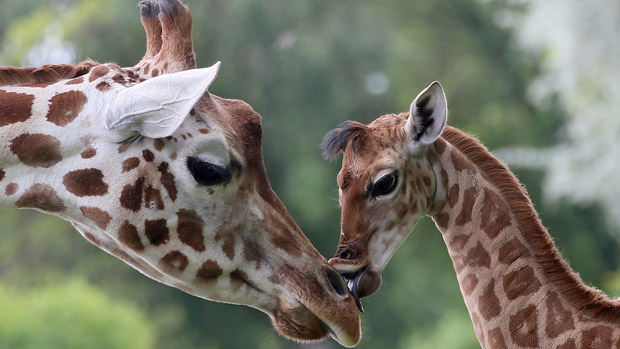Giraffes could become extinct as poaching increases
Conservationists warn that giraffes are increasingly being targeted for their 'deliciously sweet' meat

A free daily email with the biggest news stories of the day – and the best features from TheWeek.com
You are now subscribed
Your newsletter sign-up was successful
Conservationists have warned that some sub-species of giraffes could become extinct after new statistics reveal that the number of giraffes in the wild has fallen by more than 40 per cent over the past fifteen years.
There are fewer than 80,000 giraffes left on the African continent and several sub-species are already officially classified as endangered due to habitat destruction and poaching. By next year, all giraffes could be re-classified as endangered.
"People love giraffes but they're taken for granted," Dr Julian Fennessy, director of the Giraffe Conservation Foundation told The Times.
The Week
Escape your echo chamber. Get the facts behind the news, plus analysis from multiple perspectives.

Sign up for The Week's Free Newsletters
From our morning news briefing to a weekly Good News Newsletter, get the best of The Week delivered directly to your inbox.
From our morning news briefing to a weekly Good News Newsletter, get the best of The Week delivered directly to your inbox.
He warns that the animals are not being given the attention or protection they need to survive by governments and large conservation groups.
"Many of the threats to rhinos and elephants are the same for giraffes," said Doctor Noelle Kumpel from the Zoological Society of London.
However, unlike rhinos and elephants that are hunted for their tusks and horns, giraffes are increasingly being killed for their meat, particularly in Tanzania, Kenya, and the Democratic Republic of the Congo.
Giraffe meat is said to be sweet and is popular among locals. Some traditional healers even tout giraffe meat – particularly the bone marrow and brains – as a cure for HIV/Aids, fuelling the illegal trade.
A free daily email with the biggest news stories of the day – and the best features from TheWeek.com
Poachers "get a big bang for their buck because giraffes are an easy kill compared to other ungulates and you get a lot of meat," David O'Connor, an ecologist with the San Diego Zoo's Institute for Conservation Research told Take Part magazine.
Conservationists are calling for global attention to be directed towards saving the giraffe, as well as rhinos and elephants. "We don’t have the budgets to go big — we don’t get the actors and actresses. So people don’t realise that giraffes are threatened," said Dr Fennessy.
The giraffe plays a key part in the ecosystem and is "one of Africa's iconic species," said Kathleen Garrigan from The African Wildlife Foundation. "To lose them simply because we weren't paying attention would be tragic."
-
 Local elections 2026: where are they and who is expected to win?
Local elections 2026: where are they and who is expected to win?The Explainer Labour is braced for heavy losses and U-turn on postponing some council elections hasn’t helped the party’s prospects
-
 6 of the world’s most accessible destinations
6 of the world’s most accessible destinationsThe Week Recommends Experience all of Berlin, Singapore and Sydney
-
 How the FCC’s ‘equal time’ rule works
How the FCC’s ‘equal time’ rule worksIn the Spotlight The law is at the heart of the Colbert-CBS conflict
-
 Epstein files topple law CEO, roil UK government
Epstein files topple law CEO, roil UK governmentSpeed Read Peter Mandelson, Britain’s former ambassador to the US, is caught up in the scandal
-
 Iran and US prepare to meet after skirmishes
Iran and US prepare to meet after skirmishesSpeed Read The incident comes amid heightened tensions in the Middle East
-
 Israel retrieves final hostage’s body from Gaza
Israel retrieves final hostage’s body from GazaSpeed Read The 24-year-old police officer was killed during the initial Hamas attack
-
 China’s Xi targets top general in growing purge
China’s Xi targets top general in growing purgeSpeed Read Zhang Youxia is being investigated over ‘grave violations’ of the law
-
 Panama and Canada are negotiating over a crucial copper mine
Panama and Canada are negotiating over a crucial copper mineIn the Spotlight Panama is set to make a final decision on the mine this summer
-
 Why Greenland’s natural resources are nearly impossible to mine
Why Greenland’s natural resources are nearly impossible to mineThe Explainer The country’s natural landscape makes the task extremely difficult
-
 Iran cuts internet as protests escalate
Iran cuts internet as protests escalateSpeed Reada Government buildings across the country have been set on fire
-
 US nabs ‘shadow’ tanker claimed by Russia
US nabs ‘shadow’ tanker claimed by RussiaSpeed Read The ship was one of two vessels seized by the US military